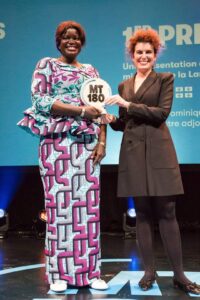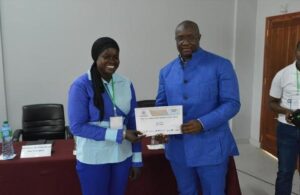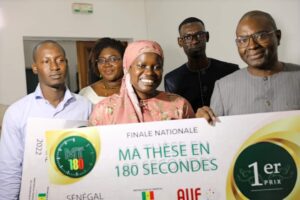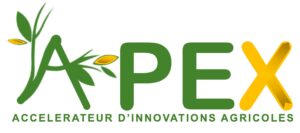On the eve of the International Day of Women and Girls in Science, we interviewed Mané Seck, a young Senegalese scientist who recently won the international competition ‘My thesis in 180 seconds’, organised by ACFAS in Canada. Her thesis deals with the development and characterisation of nanomaterials based on gum arabic and almond: orientation towards “green electronics”. Ph.D. in applied physical sciences, she did her entire studies at the Gaston Berger University of Saint-Louis. This university is currently managing a third-party project VALMEDTRA for VaRRIWA (Valorising Research Results and Innovation in West Africa ), one of the 12 initiatives supported by the ACP Innovation Fund.
Could you summarise in a few words the path that led you to Canada to win the competition “My thesis in 180 seconds”?
I was born in Louga, northwest of Senegal. After passing my bachelor’s degree, I was admitted in 2010 to the Unité de formation et de recherche en sciences appliquées et technologies of the Université Gaston Berger de Saint-Louis in Senegal, where I studied until my PhD. In 2017, I started a PhD in applied physics, specialising in electronic materials and devices. My thesis, which I defended in February 2022, aimed to develop electronic devices using natural non-toxic and biodegradable materials, to combat electronic waste that may contain toxic substances. During my PhD studies, I did research stays in laboratories abroad. I was invited to the Laboratory of Physics of Materials and Nanomaterials Applied to the Environment at the Faculty of Science in Gabes, Tunisia, to the School of Electrical and Electronic Engineering at the University of Manchester, UK and at the Department of Chemical Engineering, Polytechnique Montreal, Canada. In 2020, I won the prize for the best oral presentation at the second West African conference on renewable energy in Senegal. In June 2022, I represented my university at the national final of the “My thesis in 180 seconds” competition and won the jury’s first prize and the public’s prize, which enabled me to represent Senegal at the international final in Montreal, Canada. And I also won the jury’s first prize.

The difficulty of this competition is that you have only one slide as support and three minutes to convince a very diverse lay audience. What were the ingredients for your success?
I think it is the relevance of my topic and the quality of my performance. I would like to take this opportunity to thank the Agence Universitaire de la Francophonie in Dakar for giving me the opportunity to follow a coaching course for a few days to prepare for the international final with a coach whom I would also like to thank.
What were your feelings when you found out that you were the winner of this international competition in which 20 countries participated, including France, Canada, Belgium and Switzerland?
I was very proud and also very happy to see Senegal once again distinguished internationally. Our President of the Republic, His Excellency Mr Macky Sall, also received and rewarded me. Thanks to this prize, I was also invited by the Agence Universitaire de la Francophonie to the International Scientific Francophonie Week which was held in October 2022 in Cairo, Egypt.
Finally, you are like an ambassador for the scientific excellence of your country and also of the African continent
Exactly.

(Awards ceremony at the second West African renewable energy conference)
Apart from coaching and occasional support to get you to such and such an event, have you received other important support during your career?
Yes, during my thesis I benefited from a grant from the African Centre of Excellence in Mathematics, Informatics and ICT (CEA-MITIC). This same centre financed my research stays in Tunisia and in Manchester. During my stay in Canada, I also received a grant from the Fonds de recherche du Québec, Nature et Technologies, and the Agence Universitaire de la Francophonie fully covered my stay during my participation in the international final of the Ma thèse en 180 secondes competition in Canada.
To come back to your thesis, what really pushed you to work in this very specific field of green electronics? You mentioned the natural resources that you work with and that Senegal has…
Yes, when I became aware of the dangers of electronic waste containing toxic and non-recyclable substances, I decided to work in the field of green electronics in order to contribute to the development of electronic devices that are biodegradable and have no effect on human health and the environment.

Is there already a possibility of marketing these new-generation nanomaterials?
It is not yet possible to develop them here in Senegal. Because we don’t have all the necessary equipment to carry out these experiments. In order to carry out my experiments, I have had to do research trips abroad.
This is the eve of International Women and Science Day. You are what we call a role model for them. Women make up less than a third of the workforce employed in science, technology, engineering and mathematics, even though these are high-demand jobs of the future. Apart from inequality, do you see any other reasons why we should change this situation as soon as possible?
I just want to tell them that besides being very important to society, there is nothing more beautiful than STEM. Don’t be afraid, don’t be afraid, go and embrace it, you’ll love it for sure.
WATCH HER PRESENTATION |
Following her success in Canada, Mané SECK is now a beneficiary of another VaRRIWA third-party project, the APEX project, run by ISRA (Senegalese agricultural research institute). Her project is supported by APEX and entitled “Study of the buoyancy of pellets used in the feeding of Tilapia (Oreochromis niloticus), adjustment of the density of the mixtures for the production of an efficient and buoyant feed”. The APEX Project “Pôle d’excellence national pour mutualiser et accélérer le transfert des résultats de la recherche agricole et agroalimentaire au Sénégal” (National Pole of Excellence for Pooling and Accelerating the Transfer of Agricultural and Agri-food Research Results in Senegal ) is one of the 14 third-party projects funded by VaRRIWA in Senegal. |
